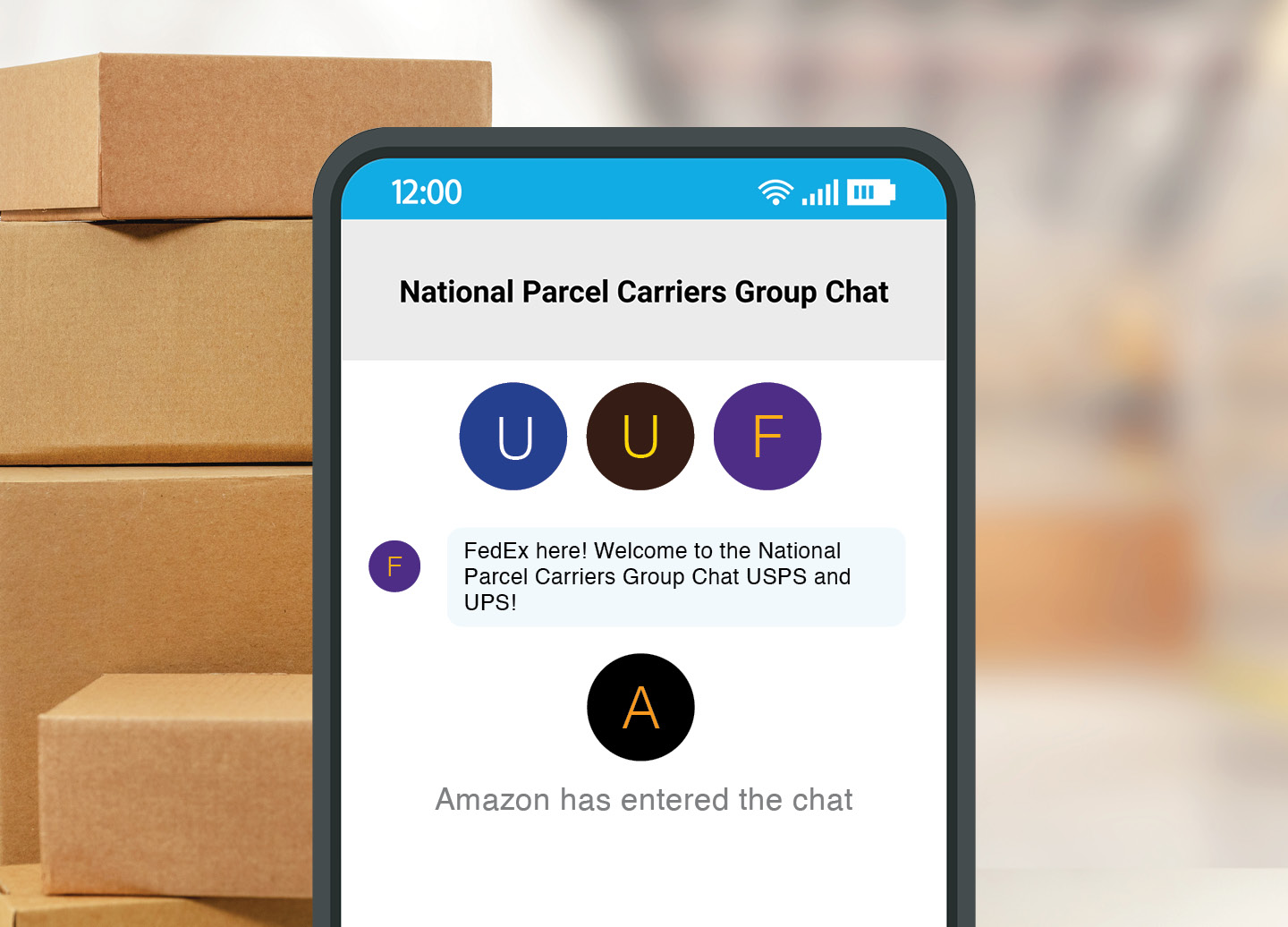Hear from a panel of ProShip shipping experts on the impending logistical complexities from Amazon’s progression to offer delivery services.
Amazon is iconic. With a world of diverse products and services, it has managed to stay one step ahead of competitors and show tremendous growth to become what some are calling the world’s most valuable brand.
But what is that next step? Will Amazon attempt to join the ranks of UPS, FedEx, and the USPS and become a national parcel carrier? We sat down with our own panel of shipping experts at ProShip to find out what they see on the horizon. (We’ve included profiles for all of our experts at the end of the questions.)
Questions on Amazon’s future in parcel delivery
What market or industry indications have you seen that Amazon will become a national carrier?
ProShip Panel: The biggest indicator that Amazon is committing to becoming a transportation provider is the large investment they have made in delivery network infrastructure. We know that Amazon already has some of the necessary tools to become a national carrier: planes, semi-trailers, and delivery vans. They have electric delivery vehicles, a buildout of new distribution centers and sort facilities, and they are hiring delivery drivers.
The important thing to note here is what are they missing? They need to be able to induct from other warehouses, whether that is through a cross dock, a true sort facility or a warehouse sort facility. What we do know is that customers are being approached to ship as Amazon and ship with Amazon trucks, and that they are actually moving packages for ‘Beta’ customers. Currently, this is just with Amazon sellers, but this could lead toward non-Amazon orders. They also launched a pilot for a service in which they acted as a third-party carrier for other businesses, but have since terminated that program. Whether they terminated it permanently or temporarily remains to be seen. Amazon has already tried to compete with ground and express outbound shipping in select use cases for premium services – e.g. furniture with shippers selling on Amazon’s Marketplace.
If Amazon does enter as a national carrier, in what kind of timeline do you see that happening?
ProShip Panel: They are already signing up select customers this year. It would not be surprising if Amazon captures early adopters as shippers who are looking to the market for new strategies and solutions with the capacity constraints seen in 2020 and constraints that will continue in 2021 and beyond. However, Amazon would probably not enter as a national carrier for a number of years. For one, it takes years to build out the network needed to transport parcels across the country efficiently. And Amazon has definitely been climbing a learning curve as they have offered door-to-door residential delivery in new markets. Also, Amazon’s recent retraction from offering their delivery service indicates they are not ready to do this. It may only be a temporary halt, but it is not likely to happen overnight. Compare the size of the fleets (like number of airplanes) between Amazon and FedEx/UPS. This will show how far behind Amazon is when it comes to building out delivery capabilities.
If Amazon does become a national carrier, would they offer any kind of delivery guarantee?
ProShip Panel: While they probably won’t offer a money back guarantee, Amazon’s focus has been on the customer experience since its inception. This will likely translate to faster delivery times and a delivery guarantee for any service Amazon provides. Since Amazon has established a two-day delivery experience through their Prime service, anything less that that associated with an Amazon delivery solution runs the risk of seeming like a regression for Amazon’s brand in the market. They have the footprint of facilities and have invested in air freight, so an express service level would be the standard go-to-market for them.
If not Amazon, is there another business or company that you think is prepared to make the shift to national carrier?
ProShip Panel: The barriers to entry to become a parcel carrier are high, especially if we are talking about becoming a national one. It requires a huge investment and decades to develop the requisite infrastructure. Also, the profitability is low, so investors are not attracted to the business proposition. This is all in spite of the fact that multiple interviews and polls with large shippers consistently indicate a desire for additional national options. Back in 2004, even DHL failed to gain market share in the U.S. as a new national carrier. Since DHL took a run at it and lost a couple billion, another contender with the pocketbook and the motivation to do so would struggle.
The larger trends that are more likely to change the carrier landscape and create opportunities for new entrants are the shift to decentralized distribution and customer expectations for same-day or next-day delivery. The days in which a shipper stores all their inventory for e-commerce fulfillment in a single distribution center or just a few regional facilities are gone. Shippers are now looking to ship online orders from any one of a number of inventory sources that are often much closer to the consumer. This may include regional distribution centers as in the past. But it will also include shipping from retail store locations and third parties, be those third partly logistics (3PL) partners or drop shipping channels via manufacturers. This greatly shortens the miles a package must travel and means that deliveries can be handled via regional carriers, metro carriers, or crowd-sourced delivery services.
Regional and local providers will need to collaborate for increased share of the e-commerce parcel market. Carrier network expansion can be slow if done alone, say a local market player in 5 top US markets partners with another regional carrier(s) to assist with delivery into a market from a shipping origin outside of that market. This is realistic to hypothesize.
If Amazon does become a national carrier, would they take the same approach to peak season as other national carriers?
ProShip Panel: This will be interesting – the cost of scaling up and providing the two-day standard hasn’t been about covering costs for Amazon. Amazon would likely get into the same competitive practices that have been established in the industry by the other carriers. This would include general rate increases, surcharges for various accessorial services, and negotiated rate agreements.
Just like the other national and regional carriers, there would be some give-and-take as they seek to differentiate themselves or catch the other industry players off guard, but it is hard to expect the behavior of any national carrier to be radically different than what is already the established norm. Overall, there would be similar pricing but Amazon will have their unique way of pricing or bidding for business that helps feed their interests most.
How would this affect the capacity constraints felt by shippers during the last year?
ProShip Panel: Numerous shippers in 2020 were scrambling to find additional carrier capacity, therefore more supply can only be a good thing for those shippers [See Single-Carrier Parcel Shipping Strategies are Dead, Here’s Why]. The industry has space for more providers on regional and local levels. However, Amazon still would need additional network growth to take on a huge volume influx to compete as a “national carrier”.
What changes do you think the other national carriers (UPS, FedEx, and USPS) would make to accommodate Amazon entering the market?
ProShip Panel: First, it will be interesting to see how the carriers react when it comes to their dealings with Amazon’s volumes. We recently saw a bit of a public feud between Amazon and FedEx. FedEx’s move out of their partnership with Amazon and shift away from USPS to their Ground Economy service primarily through their existing footprint is one strong indicator of the shake-up Amazon would have and how major national carriers will need to morph their services in competition.
The carriers all count on Amazon as a valued customer. But how long will the carriers continue to feed a growing threat to their own market share? If Amazon enters as a new national carrier, the existing carriers will likely ramp up efforts to assist Amazon’s competition with direct-to-consumer shipping needs. However, another fact that is often overlooked by pundits is that Retail is only one segment serviced by the carriers. Much of their business is for other segments, like manufacturing, healthcare, high-tech, and financial services. These B2B areas are unlikely to be affected by any changes Amazon introduces, so the carriers will seek continued growth in those areas.
How can other carriers prepare for Amazon to enter the carrier market? What should they look out for?
ProShip Panel: While regional carriers have a strong place in today’s market, more volume turned away by the majors, due to capacity constraints, will allow for regionals to expand. Focusing on level of service and continuous expansion of services levels or possible network coverage (where practical) will be key for regionals in keeping their foothold. While Amazon may represent a partnership opportunity for these carriers now, they may also represent a market share threat in the future.
Amazon launched amazon.pl in March for the Poland market. What does its entrance into European markets in recent years mean for the international shipping industry?
ProShip Panel: Assuming they increase their plane fleets, they do have the opportunity to become an international carrier with already nearly 40 fulfillment centers. Amazon’s logistics expansion is not merely with their domestic business. Amazon could put pressure on transportation companies for exports out of the U.S., and while the carriers in Amazon’s home territory in the U.S. could feel pressure from increased competition, Amazon will export this pressure to the markets of other carriers abroad at the local country level. Amazon will most likely select the markets they can gain share in to prove their value prop as a major carrier initially. International shipping between countries will bring challenges and a lot more of a coordinated pivot for Amazon – they aren’t there yet.
Who is a good fit to take on Amazon as a national carrier?
ProShip Panel: Retailers would likely be the best fit, given Amazon’s experience and brand association with retail. B2C shippers, pretty much regardless of vertical, or anyone shipping to consumers would be a good fit. Many manufacturing, e-commerce, or 3PLs already ship with amazon through MFN/FBA.
Retailers will continue to compete against Amazon and some reluctance will surface to dive into partnership with the competition. If Amazon can prove out a same-day strategy or hyper-local focus for major markets, then the healthcare and phama sector may be in the cards. This would be similar to Whole Foods’ same-day grocery delivery, but healthcare supplies/prescriptions to compete in the area of growth for parcel.
How do you see retailers reacting to Amazon as a national carrier when they are essentially competitors with their online marketplace?
ProShip Panel: This is key. Vendors selling against Amazon would be skeptical to use them, and there are many that fit that profile. Amazon is a “game” that retailers have been learning to play for a while. After all, Amazon is the largest e-commerce platform with over one-half of all online product searches happening on Amazon. Retailers want a part of that action, but they have to be cautious with Amazon collecting data about their products and customers. It is certainly in the best interest of retailers to drive as much traffic and as many transactions as possible to their own ecommerce sites. If they succeed in doing that, will they compromise their efforts by tendering packages to Amazon for delivery? If Amazon offers an attractive delivery option, then it may be worth the risk.
Retailers should look to streamline themselves and bring on new technologies to compete with Amazon before they partner. Emergence of OMS, Ship-From-Store and other omnichannel initiatives are great examples of retailers being able to compete with Amazon to control the customer experience they tirelessly refine. Overall, Amazon would be yet one more game piece on the landscape for retailers to navigate and work with.
Logistics is not a historically profitable sector for Amazon, so why would they join the carrier market?
ProShip Panel: This is an excellent point and one often overlooked by analysts looking to get clicks by raising eyebrows about Amazon disrupting UPS and FedEx. Why would Amazon invest to gain market share in a low margin business? It is likely that Amazon investing in its own fleet and delivery network isn’t as much about stealing market share from parcel carriers as it is about cornering the market in every other industry and controlling their supply chain to ensure customer satisfaction.
Amazon’s investments in grocery, pharmacy, automotive, media, etc. indicate that they don’t just want to be the leading retailer when you want to buy some random product online. They want to be the be-all, end-all of commerce. UPS and FedEx shouldn’t be as worried about Amazon transportation sales reps knocking on the warehouse doors of their existing customers, as they are of those customers shifting more of their online transactions to the Amazon marketplace where Amazon will use their own fleet to deliver the items. The end result of this is UPS and FedEx losing market share, but in a non-traditional way.
Where is Amazon making its profits now and does that translate or connect to the supply chain industry somehow?
ProShip Panel: This is a controversial topic as Amazon has faced some criticism for using profits from its high-margin businesses like Amazon Web Services to subsidize its low-margin businesses like online retailing. It impacts the supply chain industry because they are not a highly profitable customer (for UPS, FedEx fired them) and they are very demanding. Their “free shipping” puts extreme pressure on nearly every other segment of the industry. The controversy will continue if Amazon further uses profits made from non-related businesses to enter transportation.
Amazon is currently one of the largest private employers in the world, do you see a move into the shipping industry affecting that positively or negatively?
ProShip Panel: There have already been a lot of complaints from employees and criticisms by pundits over conditions for Amazon’s employees. For the delivery business, Amazon has chosen the independent contractor model used by FedEx to distance themselves from the responsibility of total compensation packages for delivery drivers and upkeep of their equipment. UPS, who employs full unionized employees for its delivery services, has long criticized FedEx for this practice and the regulatory environment that allows it to continue. Since FedEx has been able to exploit the independent contractor model successfully for so long, Amazon will likely be able to do the same. UPS will continue to be at a cost disadvantage because of this, but there is nothing they can do about it. Amazon’s delivery service will continue to fuel the gig economy.
What does Amazon’s commitment to expand its Air fleet to 85 by 2022 mean for the logistics industry?
ProShip Panel: It means Amazon is fully committed to delivering at least its own packages if not the packages for transactions of other online sellers. Amazon will continue to find ways to expand its own logistics capabilities, which includes picking up and performing end-to-end transport for its largest vendor partners. If their marketplace or other ventures cannot fill the capacity, then pivoting to be a carrier for select services would make sure that they get the return or efficiencies intended with that air freight investment. Whether or not Amazon enters the shipping business as a national common carrier remains to be seen, but the threat and rumors will always persist until it does so and either fails (like DHL in the US in 2004) or succeeds (like FedEx in the 1970s).
If Amazon doesn’t become a national carrier, do you see them making any other calculated industry moves?
ProShip Panel: Amazon will continue to invest in infrastructure to take more ownership of the delivery experience. This will mean less reliance on third party carriers. This has been an objective for Amazon since the disastrous peak holiday season of 2013. During that peak season, there was a lot of consumer frustration aimed at Amazon and the carriers. The perception that the carriers failed led Amazon to take a more hands on approach with their delivery network. One note – if not a full blown carrier, furniture assembly and other value add premium services for customer experience could certainly be a play.
Some have said that the key strength to titans like Amazon, Facebook, Apple, etc. is the consumer data they already own. How does this affect their transition into the supply chain industry as a carrier?
ProShip Panel: This is a huge advantage and a valuable asset. The other carriers don’t know a fraction of what Amazon does. Amazon likely knows almost as much about delivery carriers’ networks and delivery density as the delivery carriers themselves. Amazon knows enough to make very accurate predictive models, and no other carrier can do what they do. Especially out of the gate, they will have the data to know where they can succeed for a given shipper and where they will not want to play. Additionally, more services offered will feed more data to Amazon.
Certain clients may not want to use Amazon as a carrier because of data privacy concerns. UPS/FedEx/USPS (Big 3) most likely collect more data than people realize, but they don’t have the same reputation as a company like Amazon for storing and selling customer data. I would think Amazon is likely to market their services to customers in their vendor/seller programs, which could give them a leg up over the Big 3, as the data they have been collecting about those customers may allow them to offer a more competitive solution. Their data collection efforts are much more robust than the Big 3 carriers. In the future, this could afford them the ability to more nimbly ramp up or slow down shipping operations than their competitors in the shipping and logistics space.
If Amazon were to become a national carrier, how long would it take for an existing ProShip customer to add them as a carrier?
ProShip Panel: This is all dependent on what kind of technology integration would be required to produce labels and manifests. Amazon has historically provided a range of APIs to connect to for different Amazon services, and shipping with Amazon as a carrier would likely be no different. Potential shippers would need a technology solution that exposes the APIs, either one developed in-house or purchased from a software vendor. One of the keys to a successful implementation between a client, carrier and ProShip is communication. Presuming all parties involved are cooperative and responsive, the build will take approximately 20 business days once the build is assigned to the Development team.
What kind of visibility would ProShip customers see as shipments progress?
ProShip Panel: At minimum, Amazon would use its current tracking capabilities to show shipment progress. For orders that they fulfill and deliver, they already do map-based tracking, and it wouldn’t be surprising if they expanded on that. They would probably offer some sort of tracking API for on-demand tracking status. It is plausible that they would offer a service like UPS MyChoice to allow customers to alter delivery. Overall, visibility would be comparable to that offered by UPS and FedEx. But as stated earlier, there is a learning curve, and it would probably take a few years for Amazon to come up to par.
Parcel shipping tips for businesses that sell through Amazon
With unexpected e-commerce growth fresh in most shippers’ minds, a scalable and flexible strategy has been key for combatting the capacity constraints and surcharges that the pandemic has thrown at most businesses. While some businesses slowed spending to counteract the “COVID effect”, Amazon ran in the opposite direction and pushed profits into its transportation and logistics presence across the country, proving their focus sits squarely on controlling a package’s journey from warehouse to delivery.
Without a doubt, shoppers will continue to run to Amazon and businesses should take note and arrange their strategy before Amazon takes the step in the journey towards a national carrier. A multi-carrier shipping solution is the only tried-and-true strategy for enterprises looking to combat Amazon’s grip with an omnichannel fulfillment approach. This solution helps shippers meet and exceed customer expectations for the delivery window promise made during the shopping cart, giving an abundance of fast delivery options for multiple inventory sources located all over the country. Visibility into inventory locations and how to shorten shipping distance are benefits to executing a seamless supply chain experience via a multi-carrier solution.
The past year also proved carrier diversification is a necessity going forward. A multi-carrier shipping software simplifies the onboarding process and allows for rate shipping within one interface, carrying compliance throughout all transactions. [See: Advanced Date Shopping, a new form of rate shopping]
While it remains to be seen what is next for Amazon, most supply chain experts agree that it is a matter of when, and not if, Amazon will enter the parcel shipping industry and offer delivery services. Securing a balanced enterprise software stack with a multi-carrier software solution in advance will put businesses ahead of the curve and on track to diversify their carrier mix as well as concentrate their focus on critical omnichannel initiatives.
Learn more about automating your Amazon shipping operations by utilizing multi-carrier shipping software certified for Amazon Merchant Fulfilled Network (MFN) [View ProShip Amazon MFN API Integration Brochure]
Panel Bios:
Bill Schroeder is President of ProShip Multi-Carrier Shipping Software, where he is focused on innovation to enable ProShip to continue delivering seamless, industry-leading solutions to our customers. His depth of experience in supply chain and technologies provides immense value to our customer base that spans the globe. Prior to ProShip, Bill spent 20 years in logistics technology with FedEx, where he focused on innovation and optimization of technology processes.

Clint Boaz is Senior Sales Engineer for ProShip Multi-Carrier Shipping Software, where he leverages his expertise to show shippers how integrated multi-carrier shipping solutions can bring efficiencies to their business. Prior to joining ProShip, Clint held various roles at UPS. Clint lives in Tulsa, Oklahoma with his wife and three children.

Dan Scott is the Manager of R&D at ProShip, where he guides and facilitates the day-to-day activities of the ProShip development team to help deliver value to ProShip’s customer base. He has been with ProShip for several years primarily as a software developer before attaining his current position. He currently resides in Wisconsin.

David McQuinn is ProShip’s Carrier Liaison and an IT Project Manager where he builds relationships with carriers to facilitate fluid communications including rate updates, technical updates/inquiries and carrier onboarding. David also works closely with the R&D Team to accelerate delivery of critical solutions. Prior to ProShip, David held roles within the traveling, transportation, and advertising industries.

Jeff Lukaszewski is the Director of R&D for ProShip Multi-Carrier Shipping Software. He has been with ProShip since 2010, where he started on the professional services team designing and deploying over 100 customer solutions. After moving to R&D, he has helped with the design and development of over 50 small parcel and LTL carrier modules. Jeff has been in the logistics industry since 2004.

Justin Cramer is Co-Founder of ProShip Multi-Carrier Shipping Software, where he has deployed, designed or consulted on over 300 customer solutions within 4 continents and has designed shipping solutions executing more than 1.1 million labels a day. Justin has been on the IT side of shipping since 2001.

Tony Verrill is Director of Enterprise Sales at ProShip, with 10 years of experience in multi-carrier shipping across solution sales and partnerships. Tony enables today’s top retailers, manufacturers and third party logistics providers to streamline their omnichannel fulfillment strategies.


 Back to Blog
Back to Blog






